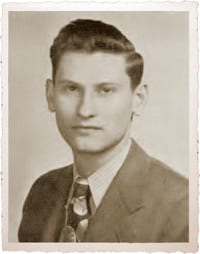It had been years since Francis Burne ’48 visited Scranton. He was there to see his son, Brig. Gen. Chris Burne ’80, deliver a speech to a group of ROTC graduates. Burne, however, had other reasons to be excited. He wanted to see how the school he loved had grown.
The Scranton that Burne knew existed almost entirely on Wyoming Avenue. Some classes were held in wooden barracks with amphitheater-style classrooms. Buildings had no air conditioning or insulation; students were hot in the summer and cold in the winter.
Scranton was still exclusively male. Students lived in modest dorms — also in former barracks. Despite the humble lodgings, they dressed for class in shirts and ties each day. Burne likened Scranton to his first military base, only with the added excitement of a college campus.
“Before attending the University, I was an aviation cadet,” Burne said. “Those lodgings reminded me of Scranton’s barracks. They were almost the same.”
While 1940s Scranton reminded Burne of the Army Air Corps, the version he saw in 2011 was quite different, in a very good way. The campus had expanded further into Scranton’s lower Hill Section and had completely abandoned Wyoming Avenue. The barracks were gone. In their place were state-of-the-art buildings, where both male and female students attended class in casual wear.
What he saw was impressive and exciting — different, but the Scranton spirit was still the same.
“The buildings and the grounds are absolutely beautiful,” Burne said. “It’s a far cry from being in barracks!”
Though Burne graduated 65 years ago, he still remembers quite a bit from his college days. More than he would’ve expected at his age, he jokes. He remembers his professors being thoughtful and caring for their students. He remembers their lectures being riveting and thorough, often straying from the course material to include additional context.
“Every teacher I ran into was quite helpful,” Burne said. “Any time you had any kind of a problem, you didn’t have to hesitate to go to them.”
When Burne graduated, he worked for a short time as a salesman and, later, an executive with United States Fidelity and Guaranty Company. His job was to manage the accounting department, among others, and he did the hiring and firing. That was the job description, but Burne says his real job was to learn about people and manage relationships, something Scranton taught him to do effectively.
“That was the best part of it all, really,” Burne said. “A lot of these agents would invite me to go to the country club to play golf. I also had people to my home for dinner. There was a lot of personal contact.”
Although Burne says Scranton helped mold him, he believes the best testament he can offer is his son, who also attended the University. “My son is just one of the greatest people I’ve ever known,” Burne said. “I am so proud of him. He’s a terrific son.”
Family is the biggest part of Burne’s life today. He is very close with his grandchildren, one of whom also picked Scranton. His second grandson recently chose another college, and while Burne says he’s disappointed they missed out on an all-Scranton family, he’s still proud of him, too. Besides, there’s always time for a transfer.



